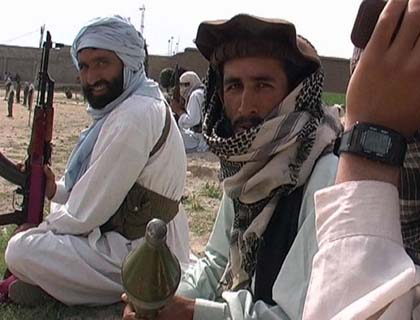The dominant discourse in mainstream Pakistani media on issues of foreign policy and national security has always been based on the narrative of the military establishment. Most Pakistani analysts, both right-wing and liberal, believe that Taliban is a nationalist movement motivated by Pashtun alienation in current power structure of Afghanistan. Be it the 'experts' of primetime TV talk shows or op-ed pages of Urdu and English newspapers, one always comes across that mantra.
This narrative is a product of the Pakistani military establishment's 'strategic depth' policy, and was propagated internationally by former military dictator Pervez Musharraf. Addressing the European Union parliament in September 2006, he said the Taliban represent Pashtuns and they could spark a 'national war' in Afghanistan. Domestically, opinion makers say that the Afghan Taliban are representatives of the Pashtun.
They say the Afghan Taliban have grassroots support in the south and southeast, and the movement is a reaction to the lack of Pashtun representation. But they also say the Afghan Taliban are a genuine resistance force fighting an ideological war against foreign invasion. The two views do not coincide.
They would never say Tehreek-e-Taliban Pakistan represents Pashtuns of FATA, or that the insurgency is a nationalist movement motivated by the grievances of the tribes. They call TTP a terrorist organization. And this is where the contradictory notion of good Taliban and bad Taliban comes into play. The Afghan Taliban are a resistance force representing Pashtuns, while their ideological brothers TTP, who also claim allegiance to Mullah Omar, are terrorists.
Ironically, those who claim that the Afghan Taliban are a Pashtun nationalist movement are not Pashtuns, such as Hamid Mir and Orya Maqbool Jan of Urdu media, or Ejaz Haider and Najam Sethi among the liberal voices. Pashtun intellectuals and journalists from conservatives like Rahimullah Yousafzai and Saleem Safi to liberals like Farhat Taj and even some Pashtuns who have been part of the military establishment such as Asad Munir, former head of ISI and MI in FATA and Khyber Pakhtunkhwa, deny that.
The folklore of Taliban nostalgia prevailing in mainstream Pakistani media that Mullah Omar had brought peace to Afghanistan is also not shared by the Afghans. The Taliban killed thousands of people until there were no rivals and no one to resist their brutality, and there was rejoice in Kabul after their government was toppled in 2001.
Afghans do not see the Taliban as a nationalist movement based on the Pashtunwali code, but influenced by Deobandi madrassas in Pakistan. They are not even a unified group. Not even all Afghan Taliban call themselves Pashtun nationalists. Although they are predominately Pashtun, many among them are from other ethnic groups, particularly in Northern Afghanistan. Local insurgent groups have multiple motivations. Some join the resistance against the perceived foreign invaders, while others fight for local purposes, such as clan rivalries and personal interests. Then there are those who fight for money.
Working on a research project in Northern Afghanistan in August last year, I met some insurgents who were not ethnic Pashtuns, but Turkmens. They told me they were paid $500 to $600 a month by a Taliban commander in Mazar-e-Sharif. That is more than what some of my colleagues were being paid by an NGO. Some of the Taliban men are opportunists who benefit from the narcotics industry and seek Taliban's shelter.
"Unlike the late 70s and 80s when Afghanistan experienced a national resistance movement against the Soviet occupation, the Taliban's claim for Jihad against Americans does not resonate with a majority of Pashtuns," according to Afghan political activist and former chief of staff at Foreign Ministry Wahid Munawar.
The central leadership of all major insurgent factions is based in Pakistan, be it the Quetta Shura of Kandahari Taliban, the Haqqani Network in Waziristan, or the Hizb-e-Islami of Hekmatyar. The commanding cadres of the movement have gone to madrassas in Khyber Pakhtunkhwa, Southern Punjab or Karachi. Balochistan and the tribal areas are recruiting centers for Afghan Taliban. While traveling on the two borders, I regularly meet Taliban who are on their way to Quetta for rest, after a month or two of fighting in Helmand or Uruzgan.
Majority of the suicide bombers in Afghanistan are traced to the tribal areas or Balochistan. What cultural or political grievances can they have about the Pahstuns of Afghanistan? The Taliban have destroyed the very foundations of centuries old Pashtun customs such as respect for tribal elders and the Jirga system.
"Taliban draw their support mostly from a tiny minority of Pashtun partly based on ideological grounds," says Rafi Fazil, an Afghan student and activist. "There is also an element of fear - given the vacuum created by the absence of government in Taliban controlled areas - that plays a key role. Not every Pashtun who sympathises with the Taliban actually subscribes to their violent ideology. Those who do, and are prepared to take part in violence, constitute a tiny minority."
Though Afghan Taliban brand themselves as a nationalist movement fighting for 'independence' and withdrawal of foreign troops, they are not supported by majority of Pashtuns, let alone other ethnic groups in Afghanistan. If there are free elections, the Pashtuns of Afghanistan would reject the Taliban, like Pakistani Pashtuns vote for the liberal Awami National Party.President Hamid Karzai received a large number of votes from the Pashtun south and southeast.
The nationalist Afghan Mellat is a popular party among urban Pashtuns. There is no truth to the statement that Pashtuns lack representation in the current power structure in Afghanistan. In fact, non-Pashtun ethnic politicians complain of the opposite - that Pashtuns hold most key ministries in President Karzai's administration.

